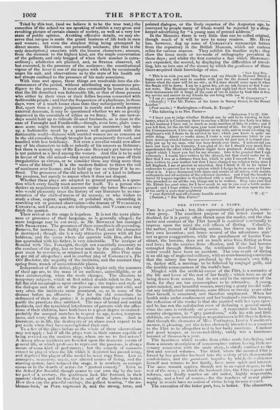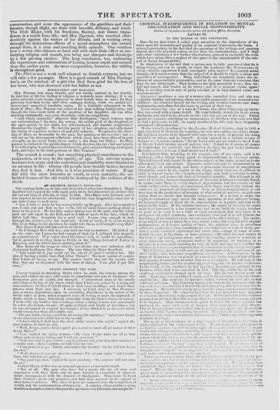THE HISTORY OF A FLIRT.
THIS is a good book ; but, like supereminently good people, some- what prosy. The excellent purpose of the writer cannot be doubted, for it is pretty often thrust upon the reader, and the cha- racter and conduct of the Flirt .herself is contrived continually to
impress upon the mind the evil effects of flirting. Unluckily, the author, instead of following nature, has drawn upon his (or her) own invention ; and hence several of the adventures start'. out as gross exaggerations, while the punishment of Louisa Van- sittart, the heroine, does not so much arise from flirting as from real love; for she marries from f.ffection, and if she had become entangled through flirtation, the retribution described by the writer would have been an accident. The true result of flirting is an old age of neglected celibacy, with an ever-haunting conviction that the misery has been produced by the woman's own folly ; or, darker still, a marriage to be followed by conjugal guilt, and the terrible consequences of the world's ban.
Mingled with the artificial career of the Flirt, is a narrative of the life and loves of the rest of her family ; which have an air of being drawn from nature, but do not add to the attraction of the book, for they are too commonplace to be attractive. A young, quiet-minded, and beautiful woman, marrying a gouty invalid with- out any intellectual attractions, some fifteen or twenty years older than herself, is unnatural, and therefore unpleasant. %Then her health sinks under confinement and her husband's irascible temper, the reflection of the reader is that she married with her eyes open: and he has not the satisfliction Mal of deducing a general moral, since the case is evidently n11ge/ler/8. A respectable but homely country clergymen, in " grey pantaloons," with his wife and little children, are nnore interesting as acquaintances in life than in fiction. And though the character of Miss Panington, Louisa Vansittart's mentor, is pleasing, yet she is too obviously intended as a contrast to the Flirt to be altogether real in her lucky marriage. Candour and good temper, at seven-and-thirty, rarely win a handsome baronet of' thousands a year. The heaviness which results from ethics made into fiction, and from a minute description of commonplace nature having little ne- cessary conoexion with the main story, is chiefly confined to the first and second volumes. The third, where the married Flirt is forced by her gambler husband into the society of' Ids, ili.Areputable confialerates, and the passionate iii wise by which she e:;tricates herself' and returns to her funnily, have more spirit and interest. The same remark applies, though not in all equal degree, to tine rest of the story ; hi which the husband dies, the Flirt repents and reforms, and finally marries an old suitiir, highly rest/fa:table, wealthy, and a lord of' course,—fiir the teachers of moral philo- sophy in novels have no notion of virtue la:ing its own reward.
The execution of the latter part, too, is better. Thu characters,
conversation, and even the appearance of the gamblers and their females, though slight, are done with breadth, delicacy, and truth. The Irish Major, with his freedoms, fluency, and innate impu- dence, is a touch from life ; and Mrs. Egerton, who married clan- destinely against the wishes of her friends, and is wasting away through the deleterious effects of a moral atmosphere she cannot escape from, is a true and touching little episode. One wonders how a writer who labours so hard and with such little effect at em- bodying religion and morals, can bring out sharpers and demireps by a few passing strokes. The long conclusion, too, embracing the repentance and reformation of Louisa, is more rapid and natural than the earlier parts. As mere composition, however, the writing is throughout good. The Flirt is not a work well adapted to furnish extracts, but we will take a few passages. Here is a good remark of Miss Parting- ton's, on the conduct of a girl who died from grief for the loss of her lover, who was drowned with her father at sea.
RESIGNATION AND ROMANCE.
Mrs. Pearson had many friends and was kindly assisted in her trouble. In that line of life the feeling of religion is certainly more stirring; it is an active principle more deeply engraven in their hearts than in ours ; for they patiently bear their lowly, and often unhappy destiny, while we, amidst nu- merous and unmerited comforts, repine. In a fortnight subsequent to the death of Mary, Mrs. Pearson was seated at her door making fishing-nets; and though the tears burst forth at the mention of her daughter, she was often chatting contentedly, nay, even cheerfully, with her neighbours. " And which character," observed Miss Partington, "most imposes upon our understanding? the love, the sorrow, the selfish grief of the daughter, or i
the aged parent, n her trials, her self-command, and humble resignation ? Doubtless the (laughter. We feel the poetry of her situation, and rally round the victim of a passion we have all probably endured. We perceive the situa- tion of Mary, so favourable to the poet, the painter, or the novelist ; but we will not see the distempered selfishness which must have been allowed to gain strength, ere her mind broke down under a fiat from her Maker. In Mary passion is clothed in the garish drapery which deceives the eve ; but our reason, if we will employ it, must, however reluct ml iv, give exclusive homage to religion,
faith i , and hope, n the tried patience of Mrs. Pearson."
The remark is sound ; but something physical contributes to the resignation, or it may be the apathy, of age. The nervous system becomes less acute and the constitutional sensibility more blunted as we advance in life : whence old people bear trouble better, because they feel it less. And this is a wise provision of nature. If age felt with the same intensity as youth, or even maturity, the en- feebled frames of the old would be destroyed by the violence of the shock.
AN AMATEUR JOCKEY'S DISCOURSE.
Our evening broke up at last, and these tete-h-tetes were demo)ished. Major Sandliwd had enjoyed his with equal guilt, for he had discovered an auditor who did not cut him, or ridicule, or reply to him. Miss Bates only listened, and it was imputed to her for admiration. I heard his very disagreeable voice rise as our tones began to melt away. " Yes, I told in' uncle he was wrong to take up the gray. Give her a month's rest, I said, and put Bob to her work ; but us' uncle knows nothing about a horse or its power. Ile has fitly useless horses now in the park, and the whole pack are not equal to Illy Bob, and so I told in' uncle to his face, which he did'nt half like. Langliam has a good stud. I came time enough to look through the stables—very fair turn-out. I told in' uncle, if he chose to have fifty d—n things in his premises, be might ride them, so I brought away Bob." Miss Bates looked and listened on in silence.
" So I brought Bob with me; you shall see him to-morrow. He kicked up on his road ; but I guess he had enough of that, for I galloped him properly as a punishment. If m' uncle shoed his horses well, it would be something ; but he persists in sending them to Dodds in the village, instead of Farley at Kingston, and the fellow knows nothing about it."
Miss Bates sat the image of silence : her silence was ever unbroken till it discharged itself upon Mrs. Jones. The very thing for Major Sandford.
" You would die if you could see the cut of in' uncles saddles, too. The idea of having a saddle from that fellow Turner ! No inure notion of a saddle than I have of laying an egg. The grooms won't stay out the month with him, they are so disgusted with the state of things. I tun glad I got Bob away."
DEATH AMONGST THE POOR.
I never wearied in attending Henry when he made his rounds among the poor, and visited the.' sick with words of consolation aunt acts of kindness : the occupation gave me health and strength. I understood MOD.: of the morals and religious fecling of the lower orders than I had ever gained by reading and conversation ; for here I beheld them its their own dwellings, and heard their sorrows from their own lips. I ebserved, as I had done in 3Irs. Pearson's ease, is strong dependence upon an overruling Providence in the minds of the better order of poor, and a prepared state of feeling to meet the approach oh' death, which is more laboriously concealed frotts the higher classes of society. 1 went II I thi my brother into a cottage where a dying woman was surrounded by a few affectionate friends: all spoke feelingly and -kindly of her illness, but no one attempted to conceal her danger ; it was alluded to as an event which would release her from all worldly care.
"Du you think, jenny, you'll be thr seeing the morning?" asked one friend, as she administered a little ten to the in valid.
"1 don't think I shall hear the clock strike twelve this night," replied the poor woman, in faint accents.
" Well, Jenny, you've lived a good piece, and we must all go scones: or later to our 3lak,.r."
replied the dying woman, "lie says, • Come unto me all ye that labour ;old are hoary laden, and I will give you rest.'" " Your husband is gone belitre you, neighbour, and your daughter married to a steady man: there's nothing to bide here for now."
"1 am content to go," thins!): articulated the invalid, "for he will not desert his own,"
" Well, Jenny, if yttu are alive to-morrow, I'll see you again,- said a neigh- bour, %silo had not yet spoken. "8aV good-bye now," replied the poor creature; •• the morrow will not come for me."
I asked Henry it' this was an unusual specimen of mmourtly tnsth.
" N ot at MI. Tlw ;umr who have led a steady life are all very well acquainted le ith their I tilde, and its pure duet rile.' is a fountain of repose to minds unacquaimed with the disputes of theologians. They learn 1■y- heart their Saviour's de,ols and promises. ;tod timid their account by its ...wort in their hour of sickness. This class of poor site removed from the temptsi ion of wealth and the contamination of depravity. A country village produces many worthless characters, but it also presents specimens of a Christian and simple life."



























 Previous page
Previous page